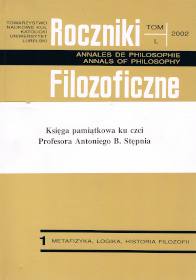The problem of truth in the work of art
Abstract
The text aims at considering from various points of view the presence of the value of truth in the work of art. The first step is a phenomenological analysis of epistemological, ontological and aesthetic phenomena connected with perception of the work of art. Its conclusion is the statement that truth belongs to the characteristics of both creation (contents, structure) and reception (cognition of various aspects) of the work. The very fact that the aesthetic value of the object claiming to be beautiful can be discussed proves the presence of the object on the rational-veritable plane.
The next aspect undertaken in the article is concerned with the epistemological and methodological criticism of the view (represented here by R. Ingarden) that there is a radical difference between the objective domains of science and art. An attempt is made to show that the view is rooted rather in ideologically understood scientism and neo-positivism than in a realistic conception of cognition through art. In a completely realistic attitude the borderline between 'what is rationally cognised' and 'what is beautiful' (the sphere of quasi in Ingarden's meaning) is not an absolute borderline. The domain of the work of art also contains cognitive elements, often existentially and morally essential for man's life.
As it appears, a similar position can be found in G. B. Vico's texts that proclaim the unity of poetic and metaphysical perspective in ancient beginnings of anthropological thought about the human world. Nowadays a methodological tendency is observed on the philosophical plane that allows joining the veritable and aesthetic aspects, and hence exploring the objective domain of art in the cognitive aspect. This is expressed today, among others, in the increase of the significance of art in social, cultural and scientific life.
Copyright (c) 2002 Roczniki Filozoficzne

This work is licensed under a Creative Commons Attribution-NonCommercial-NoDerivatives 4.0 International License.





